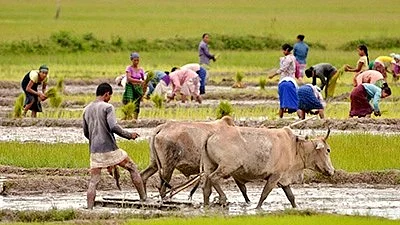The Union government recently announced a ban on export of rice. The duty/cess/surcharge on cooking oils has been reduced to just 5.5% in the wake of Russia’s invasion of Ukraine. But even after supply chains were restored and global prices stabilised, import duties have not been restored.
These two recent decisions are good examples of ad hoc policies and ill-considered actions of successive governments playing havoc with the agricultural sector. Let us take the export ban of rice. For decades inter-state trade even within the country was banned or restricted. For instance, in 2011 there was a glut in rice production in united Andhra Pradesh, and BPT paddy sold at ₹750 per bag of 74 kg. At the same time, in the neighbouring states of Karnataka and Maharashtra there were shortages and the price was ₹1,200 per bag. Yet, the AP government banned transport and sale outside the state, hurting the farmers of AP and consumers of neighbouring states. Lok Satta movement then mobilised farmers of all sections, led padayatras and braving arrests, transported and sold rice in neighbouring states violating the control orders. In the face of public outcry and the manifest injustice and irrationality of the restrictions, the government was forced to ignore its own trading restrictions, and within a few days the prices equalised in all states. The farmers of AP benefited to a tune of ₹3,600 crore in just one season on free trade of one variety of one crop. That is how much they were losing on account of unfair, unjust and irrational controls.
During that period, the Union government’s ban on non-Basmati rice export was in place. India had the largest reserve of food-grains stored in government granaries – peaking at 80 million tonnes. Owing to excess supply, prices in India were falling. But there were global shortages, and prices ruled high. Again Lok Satta mobilised farmers and parties in AP to build consensus on export of rice. I met the Prime Minister, Dr Manmohan Singh, and presented the data. The Union government was persuaded that export ban is hurting our agricultural sector needlessly and depressing incomes, and the ban was lifted. Since then India has been the biggest exporter of rice.
Only July 1, 2023 the FCI had 25.3 million tons of rice in the central pool, against the foodgrain stocking norm of 11.54 million tonnes. When there is no shortage to meet the domestic needs, the knee-jerk reaction of banning exports is self-defeating. If free trade is allowed, prices of transportable and tradable non-perishable commodities equalise. Indian agriculture is in perpetual crisis. While 45% of the people depend on agriculture for their livelihood, the share of the farm sector in GDP is only 15%. Simple arithmetic tells us that the per capita income of those in the farm sector is only 22% of the per capita income of the rest of the population. It is obvious that we need to do everything possible to enhance farmers’ incomes; and that means implementing policies that give farmers a good price.
An export ban also hurts us in global markets in other ways. Once we withdraw from global trade, it will be harder to find markets for our produce when we re-enter. Traders need assured supply chains. If supplies are uncertain, Indian exporters, and therefore farmers, get lower price. The world over, governments do everything possible to boost agri exports, and to reduce dependence on agri imports. Agriculture is always a difficult and uncertain occupation. Therefore public policy should be alert and sensible to protect incomes.
Subsidies to agriculture are necessary. But the best form of help to farmers is reasonable and stable market price. No subsidy can match higher incomes. The Union government is giving subsidies to agriculture to a tune of ₹6,00,000 crore. States are probably spending ₹3,00,000 crore more in the form of free power, irrigation and other subsidies. But the lot of the farmers is not improving because of short-sighted policies and knee-jerk approach of successive governments.
Take oil seed sector. About 20% of the farmers in India produce oil seeds in about 27 million hectares of land. Indian productivity is low and cost of production is high. We have huge shortages. India is the largest importer of cooking oil in the world. Last year, we imported about 16 million tons of cooking oil at a cost of ₹1,51,000 crores. For years, some of us have been urging the government to impose a reasonable import duty so that Indian farmer can compete in the market. If farmers are given decent price and technology, over a few years our production will meet the demand, and India will not have to depend on exports for a major food item. At last, after decades of dithering, the government imposed import duty on cooking oil. The duty was not constant – varying from 44% to 27%. With Russia’s invasion of Ukraine, global cooking oil prices shot up. In order to reduce the consumer price of oil, the tariffs were removed, and a nominal 5.5% cess and surcharge was imposed. Now global cooking oil prices eased, as supply chains were restored. But the government extended the tariff exemption for another year. As a result, the farmers’ income has fallen. The price of palm fruits, the raw material for palm oil, has fallen by 40-50% compared to last year. The net income of farmers would have fallen by 80-90%.
Knee-jerk reactions in agricultural trading policies do enormous damage to the long[1]suffering, impoverished sector. We tend to ban exports denying our farmers the benefit of global prices; and we tend to lower tariffs forcing our farmer to suffer unfavourable competition. It is often unthinking ad hoc policies, not vagaries of nature, that harm our farmers.
The author is the founder of Lok Satta movement and Foundation for Democratic Reforms. Email: drjploksatta@gmail.com / Twitter@jp_loksatta






